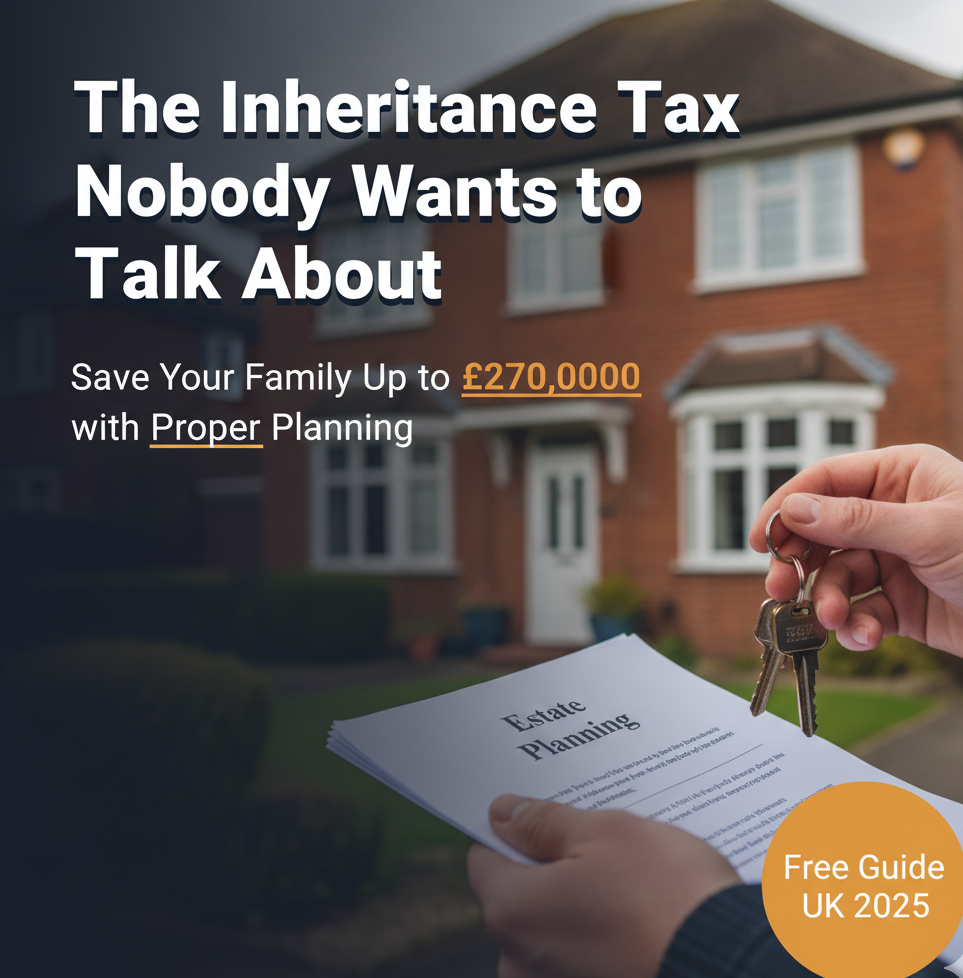
Here’s something peculiar about British culture: we’ll happily debate the weather, argue about Brexit for hours, even discuss our NHS wait times—but mention inheritance tax at a family gathering, and suddenly everyone’s desperate for a refill.
Maybe it’s because talking about inheritance tax means acknowledging our own mortality. Or perhaps it’s the uncomfortable reality that HMRC wants a slice of what you’ve spent a lifetime building. Whatever the reason, this silence costs families billions in unnecessary tax every year.
I’ve watched too many families discover—often weeks after a funeral—that a huge chunk of their inheritance is about to vanish into the Treasury’s coffers. The worst part? Most of it could’ve been avoided with some straightforward planning.
So let’s have that awkward conversation. Right now.
What Actually Is Inheritance Tax? (And Why Does It Feel Like Highway Robbery?)
Inheritance tax (IHT) is the government’s 40% cut on your estate when you die. That’s not a typo. Forty percent.
Your “estate” includes everything you own: property, savings, investments, business assets, that classic car in the garage you keep meaning to restore, even your ISAs (yes, even those supposedly tax-free accounts). Add it all up, subtract any debts, and if the total exceeds the £325,000 threshold, HMRC starts sharpening its pencils.
This £325,000 threshold is called the nil-rate band. Romantic name, isn’t it? It’s the amount you can pass on without triggering inheritance tax. Anything above that gets taxed at 40%—unless you’ve done some planning.
Reality Check: With the average UK house price hovering around £290,000 (and significantly higher in London and the South East), many ordinary families now find themselves caught in the inheritance tax net. This isn’t just a “problem for the wealthy” anymore.
The Numbers That’ll Make You Wince
Let me paint a picture. Say your estate is worth £625,000—not unreasonable if you own a modest home in much of southern England and have some savings.
Here’s the maths (or try our inheritance tax calculator): £625,000 minus £325,000 = £300,000 taxable. At 40%, that’s £120,000 going straight to HMRC. Your beneficiaries receive £505,000 instead of the full £625,000.
Still think inheritance tax doesn’t apply to you?
| Estate Value | Nil-Rate Band | Taxable Amount | Inheritance Tax Due (40%) | What Your Family Receives |
|---|---|---|---|---|
| £400,000 | £325,000 | £75,000 | £30,000 | £370,000 |
| £500,000 | £325,000 | £175,000 | £70,000 | £430,000 |
| £750,000 | £325,000 | £425,000 | £170,000 | £580,000 |
| £1,000,000 | £325,000 | £675,000 | £270,000 | £730,000 |

The Residence Nil-Rate Band: Your Home’s Secret Weapon
Right, here’s where it gets slightly less depressing. If you’re passing your home to your children or grandchildren, you might qualify for an additional allowance called the residence nil-rate band. This adds another £175,000 to your threshold.
Combine this with the standard nil-rate band, and you can potentially pass on £500,000 tax-free. Married couples and civil partners? You can combine your allowances, creating a threshold of up to £1 million.
But (there’s always a but) this only applies if:
- You’re leaving your home to direct descendants—children, grandchildren, step-children count; siblings and friends don’t
- Your estate is worth less than £2 million (it tapers away if you exceed this)
- The property was your residence at some point (doesn’t have to be when you die)
The rules are fiddly. Annoyingly so. This is where speaking with specialists in inheritance tax planning becomes less of a luxury and more of a necessity.
Gifts: The Seven-Year Itch
One strategy people often try is giving money away before they die. Smart thinking—except inheritance tax has a long memory.
If you die within seven years of making a gift, it still counts toward your estate. This is called the “seven-year rule,” and it’s caught out more people than I can count. Made a substantial gift to your daughter for her house deposit six years ago? That’s still potentially taxable.
However, there’s a sliding scale called “taper relief” that reduces the tax charged if you survive between three and seven years:
| Years Between Gift and Death | Tax Rate on Gift |
|---|---|
| Less than 3 years | 40% |
| 3-4 years | 32% |
| 4-5 years | 24% |
| 5-6 years | 16% |
| 6-7 years | 8% |
| 7+ years | 0% |
Note: The percentages apply to the tax, not the gift itself. So if you’d owe £40,000 at the full 40% rate, you’d owe £32,000 at the 32% rate after 3-4 years.

Annual Exemptions Worth Remembering
Not all gifts get caught in the seven-year trap. You can give away £3,000 each tax year without it counting toward your estate—and if you didn’t use last year’s allowance, you can carry it forward once (making it £6,000).
Wedding gifts have their own special allowances: £5,000 to a child, £2,500 to a grandchild or great-grandchild, £1,000 to anyone else. Small gifts of up to £250 per person per year are also exempt, as long as you haven’t used another exemption for that person.
The “Normal Expenditure” Loophole: This one’s brilliant if you have regular surplus income. You can make regular gifts out of your income (not capital) without them counting toward your estate—no limit. But you must be able to prove they’re regular, made from income, and don’t affect your standard of living. Keep meticulous records. (Our bookkeeping services can help with this).
Business Relief: The Entrepreneur’s Exit Strategy
If you own a business or agricultural property, Business Relief might save your heirs a fortune. Qualifying business assets can receive 50% or even 100% relief from inheritance tax.
To qualify for 100% relief, you typically need:
- A trading business (not investment or property rental)
- To have owned it for at least two years before death
- The business to remain trading at the time of death
This is genuinely one of the most powerful reliefs available, but the rules are Byzantine. The difference between “trading” and “investment” businesses can be surprisingly subtle, and getting it wrong means your family loses the relief entirely.
Companies offering comprehensive business accounting services and tax advisory often help structure businesses to maximise these reliefs—something to consider long before you need it.
Charitable Giving: Doing Good While Paying Less
Here’s an interesting quirk: leave 10% or more of your estate to charity, and HMRC reduces the inheritance tax rate on the rest from 40% to 36%.
Sound counterintuitive? Let’s do the sums on a £1 million estate (after the nil-rate band):
Without charitable giving:
- Taxable estate: £675,000
- Tax at 40%: £270,000
- Your family receives: £730,000
With 10% to charity:
- To charity: £100,000
- Remaining taxable: £575,000
- Tax at 36%: £207,000
- Your family receives: £693,000
- Total passed on: £793,000 (£63,000 more)
Yes, your family gets slightly less (£37,000 less), but £100,000 goes to causes you care about, and HMRC gets £63,000 less. Some people find this trade-off worthwhile. Others don’t. That’s fine—it’s your estate.
Trusts: Complicated but Sometimes Brilliant
Trusts sound intimidating. They are a bit. But they’re also one of the most flexible tools for managing inheritance tax.
In simple terms (and trust lawyers forgive me for this oversimplification), a trust is a legal arrangement where you transfer assets to trustees, who manage them for your beneficiaries according to rules you set.
Different trusts work for different situations:
- Discretionary trusts give trustees flexibility to decide who benefits and when
- Life interest trusts let someone benefit from assets (like living in a house) without owning them
- Bare trusts are simpler—beneficiaries have an absolute right to the assets at 18
Trusts can protect assets from care home fees, ensure money goes to grandchildren even if your children remarry, or keep a family business intact across generations.
But trusts have their own tax rules, ongoing administrative requirements, and setup costs. They’re not for everyone, and they’re definitely not a DIY project. If you’re considering trusts as part of your estate planning, proper financial advice is essential—ideally from specialists who understand both the legal structures and the tax implications.

Life Insurance: The Straightforward Solution
Sometimes the simplest solution is the best. Life insurance can provide the cash to pay an inheritance tax bill without your family needing to sell assets.
The key? Write the policy “in trust.” This keeps the payout outside your estate, so it doesn’t add to the inheritance tax liability. Without the trust, you’ve just increased the problem you were trying to solve.
This works particularly well when your wealth is tied up in property or a business that you don’t want forced into a fire sale to pay the tax bill within HMRC’s six-month deadline.
When Do You Actually Have to Pay?
Here’s something that surprises people: inheritance tax is due within six months of death. Miss that deadline, and HMRC charges interest.
Six months sounds reasonable until you realise probate often takes longer than that, especially if the estate is complicated. (This is where the IHT 400 form comes in). And you typically can’t access estate funds without probate. See the problem?
You can sometimes arrange to pay tax on property in instalments over ten years, but interest still accrues. This is another reason life insurance written in trust makes sense—it provides immediate liquidity.
Feeling Overwhelmed? You’re not alone. Inheritance tax planning involves navigating complex rules around gifts, reliefs, trusts, and business structures. At Ask Accountant, we provide proactive tax advisory solutions and business growth planning designed to protect what you’ve built.
Located at 178 Merton High St, London SW19 1AY, we’ve helped countless families across London navigate these waters. Whether you need help with tax advisory solutions, understanding business relief, or comprehensive estate planning, we’re here to help.
Give us a ring on +44(0)20 8543 1991. Let’s have a conversation that could save your family a fortune.
Common Mistakes That Cost Thousands
- Assuming you’re not wealthy enough to worry. With property values where they are, millions of ordinary families now face inheritance tax.
- Leaving it all to sort out later. Later has a habit of arriving faster than expected, and by then your options are limited.
- Making gifts without recording them properly. If you can’t prove when you made a gift or that it was from income, HMRC will assume it’s taxable. (A bookkeeping service can be invaluable here).
- Forgetting about jointly owned property. How you own property with someone (joint tenancy vs tenancy in common) affects what happens when one of you dies.
- Not updating your will after major life changes. Marriage, divorce, children, new property—all should trigger a will review.
- Assuming pension pots are part of your estate. They’re usually not (good news!), but the rules around who can inherit them have changed in recent years.
The Pension Wildcard
Quick aside on pensions because they’re often misunderstood: most pension pots don’t form part of your estate for inheritance tax purposes. That makes them surprisingly efficient for passing wealth to the next generation.
If you die before 75, your beneficiaries can inherit your pension completely tax-free. After 75, they pay income tax at their marginal rate—but still no inheritance tax.
This means if you’re fortunate enough to have multiple income sources in retirement, drawing from taxed assets first and leaving pensions until later (or not touching them at all) can significantly reduce your estate’s tax liability.
What About Couples?
Transfers between spouses and civil partners are completely exempt from inheritance tax. You can leave everything to your partner without any tax at all.
Even better: any unused nil-rate band or residence nil-rate band transfers to the surviving spouse. So if you leave everything to your spouse (using none of your allowance), they effectively get a double allowance when they eventually pass away.
That’s how married couples can potentially pass on up to £1 million tax-free—combining both nil-rate bands (£650,000) and both residence nil-rate bands (£350,000).
But this only works if you’re married or in a civil partnership. Unmarried couples, no matter how long they’ve been together, don’t get this exemption. It’s one reason some long-term couples eventually decide to make it official.
What Happens If You Do Nothing?
Let’s be blunt: if you die without planning, intestacy rules decide who gets what. These rules are rigid and often don’t match what people would have wanted.
Unmarried partners? They get nothing under intestacy rules, regardless of how long you’ve been together. Your estate goes to children, parents, siblings—in that order. And the inheritance tax bill still comes due, based on the total estate value.
Even with a will, without tax planning, your family might face a substantial inheritance tax bill that could force the sale of property or business assets at the worst possible time.
Frequently Asked Questions About Inheritance Tax
Q: Is there inheritance tax on property?
Yes, property forms part of your estate. However, the residence nil-rate band provides additional relief if you’re passing your home to direct descendants.
Q: Do you pay inheritance tax on gifts?
Potentially, yes—if you die within seven years of making the gift. However, various exemptions exist for small gifts, regular gifts from income, and wedding gifts.
Q: How much can you inherit without paying taxes in the UK?
The basic threshold is £325,000. With the residence nil-rate band, this can increase to £500,000 for individuals, or £1 million for married couples passing on a family home.
Q: Can I avoid inheritance tax by giving everything away before I die?
Theoretically yes, if you survive seven years after making the gifts. But you need to be careful—giving away your home while continuing to live in it doesn’t work. You’d need to pay market rent to avoid “gifts with reservation” rules.
Q: What’s the difference between inheritance tax and capital gains tax?
They’re completely separate. Inheritance tax is charged on your estate when you die. Capital Gains Tax is charged on profits from selling assets during your lifetime. When someone inherits assets, they generally receive them at current market value for CGT purposes (called “uplift on death”), so inherited assets don’t carry forward capital gains from the deceased.
Q: Are life insurance payouts subject to inheritance tax?
Only if the policy wasn’t written in trust. If it’s in trust, the payout goes directly to beneficiaries outside your estate.
Start the Conversation Today
Nobody likes thinking about death. I get it. But inheritance tax planning isn’t really about death—it’s about protecting what matters to you.
Maybe that’s making sure your children can keep the family home. Perhaps it’s preserving a business you’ve built from scratch. Or it could be leaving something meaningful to causes you care about without punishing your family in the process.
Whatever your situation, the worst strategy is pretending inheritance tax doesn’t exist. Because while you’re not thinking about it, the clock’s ticking, and opportunities are passing.
The good news? With proper planning—even straightforward strategies—most families can dramatically reduce their inheritance tax liability. It just takes that first conversation.
And yes, these conversations can feel uncomfortable. But they’re nowhere near as uncomfortable as your grieving children discovering they owe HMRC six figures they don’t have.
So let’s talk. Before it’s too late.








backlinks websites list
November 17, 2025Thanks for sharing the information with us.
Seo Backlinks
November 25, 2025Best content, Really enjoyed studying.